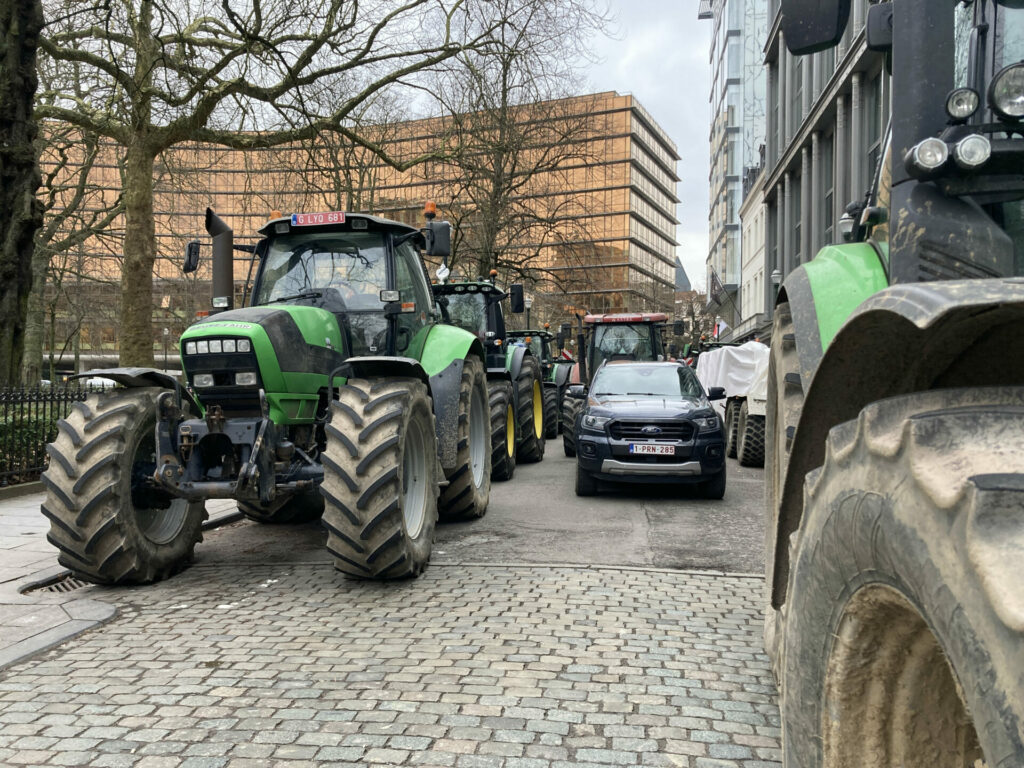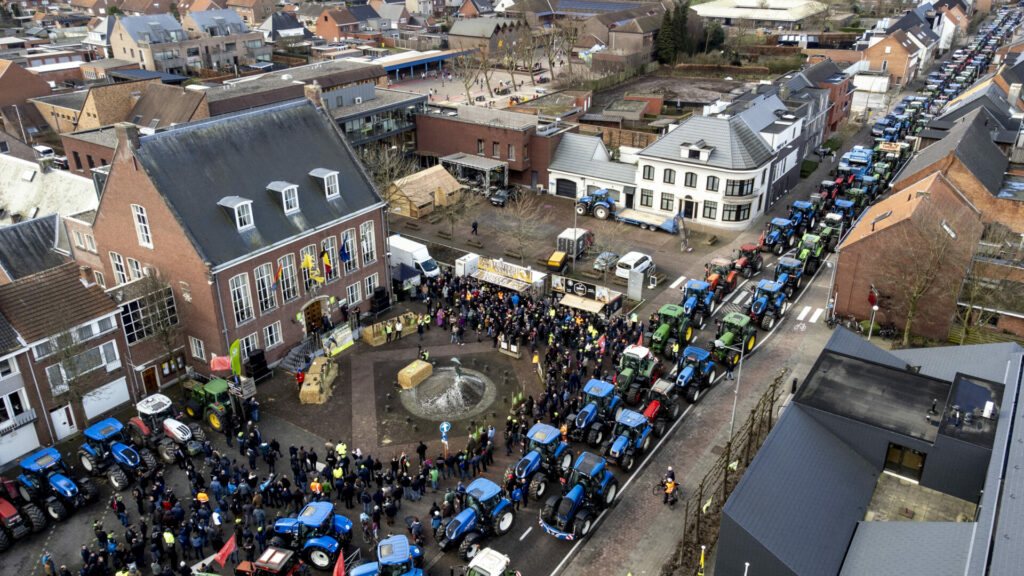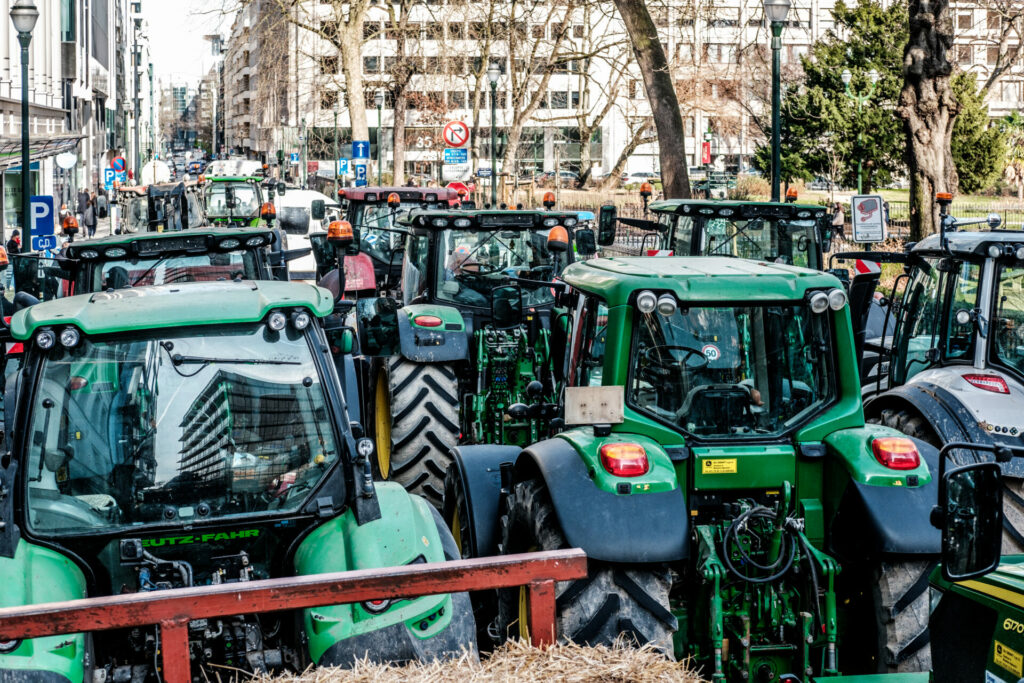Major traffic disruptions are expected throughout the Brussels-Capital Region all day on Wednesday and Thursday, as a large farmers' demonstration will take place at the same time as a European summit in the city's Schuman district.
Traffic problems will occur on the entire territory of the Capital Region on both days but most issues are expected on Thursday, announced the National Crisis Centre. That day, the Reyer Tunnel from the E40 motorway in the direction of the city centre will be closed from 07:00, as will the Cinquantenaire tunnel towards Arts-Loi, announced the Brussels-Capitale/Ixelles police.
Police expect the small Ring Road around the city centre (R20) to be inaccessible to cars, as will the Arts-Loi intersection. "Rue de la Loi and the European quarter could also experience heavy traffic disruption."
Most of the farmers and protesters will drive their tractors to Brussels to demonstrate at Place Luxembourg. While most will arrive in the morning via numerous approach roads – which will heavily disrupt rush hour – traffic issues are expected until late afternoon.

Several tractors are parked at the Square Meeûs in Brussels city centre, part of a farmers' protest. Credit: Belga/Lou Lampaert
Disruptions will likely be felt across Belgium as convoys of tractors drive to the capital. Police advise not to travel to Brussels by car on Wednesday and Thursday but instead take public transport – specifically trains and metros, as buses and trams will likely also be held up. Real-time updates will be posted on the day on the police's social media channel.
Thursday's protest comes as farmers carry out actions across Europe and Belgium. Though campaigns vary in different regions they share a strong criticism of "a tsunami" of EU regulations, which are then transposed by Member States.
All over Brussels and Belgium
Since Monday, around 20 tractors have been blocking Place De Meeûs, near Place de Luxembourg in Brussels' Leopold district, where they are planning to stay until the European summit on Thursday. More farmers are expected to join on Tuesday night and evening; others from France and Luxembourg may also join later.
Farmers' organisations have announced a number of other protests across Belgium over the course of the week.
Motorway blockades started on Sunday and have continued to disrupt traffic on Belgian key roads on Monday and Tuesday. A group of farmers has been blocking access to the Brussels Ring Road near Halle since early Monday morning and will remain there "until at least Thursday."
On Wednesday, the General Farming Syndicate (ABS) will hold actions at all the slip roads on the motorways in the provinces of East Flanders and West Flanders at least until Thursday night. The same will happen in Brussels' European quarter on Thursday and possibly also at the Bijloke in the city of Ghent.

Aerial picture shows tractors during a farmers' protest in Merksplas, Tuesday 30 January 2024. Credit: Belga/Dirk Waem
Protests are expected at the port of Antwerp on Wednesday, with plans to block crossings such as locks, preventing ships from continuing. The port has asked staff to work from home if possible, though for most port workers it is not.
The Farmers' Union (Boerenbond) will also organise demonstrations in Ghent and Genk (Limburg) on Thursday. However it added that traffic disruptions such as those on Monday are no longer expected.
Actions are also announced in Roeselare and Kampenhout-Sas on Friday as well as in Genk next Friday, when an informal meeting of 31 European Industry Ministers and their staff will take place. However, it also supports any spontaneous actions by farmers and farmers' organisations "in the coming weeks" to make farmers' voices heard clearly in a respectful and non-violent way.
Related News
- Farmer protests cause severe De Lijn bus delays around Brussels and Antwerp
- 'Protest is allowed, vandalism is not': Belgian PM wants to end farmers' blockades
- Farmer protests: Tractors blocking key roads in and around Brussels
Farmers are denouncing the "spaghetti of regulations, to the point of absurdity," as well as specifically imposed dates on which to sow crops, and the Nature Restoration Act or subsidies for reforestation. "Farmers are pushed into a straitjacket of thresholds they have little impact on, but which have very big implications for their business." They also want increased budgets for the Common Agricultural Policy (CAP) to support Belgian farms.
Criticism will also be directed towards the EU-Mercosur agreement, which seeks to open up free trade with Latin American countries. Farmers fear that this will lead to excessive competition and drive prices down further. For instance, it would allow for significant quantities of Argentinian or Brazillian beef to be sold in Europe, despite the standards for production being lower than those to which European farmers must adhere.

